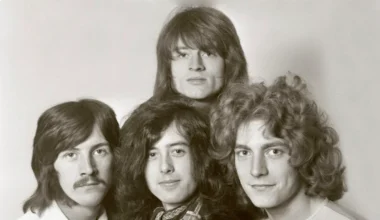Being in a band is a balancing act. Creative voices often clash, and even the most harmonious groups face moments of tension. While Led Zeppelin soared as one of the most iconic rock bands in history, Robert Plant revealed that working with their quiet yet genius bassist John Paul Jones wasn’t always smooth sailing.
From the start, Led Zeppelin was a sum greater than its parts. Plant was the embodiment of a frontman, with charisma and vocal power. John Bonham’s drumming was so integral that the band couldn’t continue after his untimely death. At the heart of it all, Jimmy Page’s groundbreaking riffs defined the band’s sound, creating an unmistakable identity on tracks like “Whole Lotta Love” and “Heartbreaker.”
Yet, Jonesy’s contributions often flew under the radar. Far from just a bassist, he was the band’s secret weapon—a musician’s musician. Whether crafting memorable basslines in “Ramble On” or adding complexity to tracks like “Black Dog,” his touch was indispensable. Behind the scenes, Jones often orchestrated their grand epics, blending rock with classical influences and pushing their sound beyond the conventions of the genre.
However, Plant admitted there was some friction when collaborating with Jones. “It was always difficult to collaborate with Jonesy because he never listened to the lyrics,” Plant once said. “I’d talk about a song, and he’d ask: ‘Now, which song would that be?’ I’d say, ‘You know, the one on Presence.’ And he’d reply, ‘I’m not familiar with the titles, what key was it in?’ I’d sigh and say, ‘I haven’t a clue, Jonesy.’”
Despite these challenges, Jones’ ability to inject his sophisticated musicality into Zeppelin’s work left an indelible mark. He helped shape the band’s legendary sound, ensuring their music would resonate across generations. Tracks like “Kashmir” or “No Quarter” showcase his unique approach, seamlessly blending complexity with accessibility.
Jones didn’t stop with Zeppelin, either. After the band disbanded, he continued to explore new musical frontiers, collaborating with acts like R.E.M., Foo Fighters, and Them Crooked Vultures. To him, Zeppelin was just one chapter in a much broader story.
While Plant and Jones may have had their creative differences, those moments of artistic tension were a small price to pay for the timeless music they created together. Led Zeppelin’s legacy endures, thanks in no small part to the understated brilliance of John Paul Jones.







